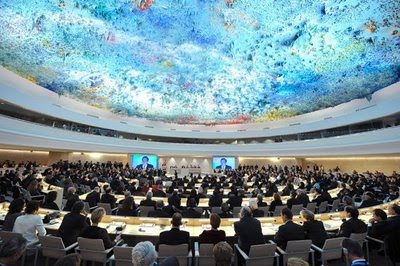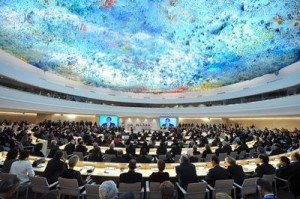|
Yesterday, in an emergency session of the HRC dealing with ongoing violence against protestors in Syria, and despite the release of a UN fact-finding committee report in which the Office of the High Commissioner for Human Rights described repression of protestors as likely to amounting to crimes against humanity, the Syrian government continued to deny any responsibility for rights violations, and instead rejected the credibility of the Human Rights Council. The Syrian government refused to acknowledge that peaceful pro-democracy protests are being repressed, and instead falsely described events in the country as a battle between a group of armed militias rioting and undermining security and security forces who have been forced to respond to the aggression of these armed militias. Several Arab and non-Arab governments—56 in total—presented oral interventions, which were overall critical of the deteriorating conditions in Syria. These states included Saudi Arabia, Qatar, Egypt, Iraq, Poland (as President of the European Union) and Iran.
Ambassador Hisham Badr, speaking on behalf of the Egyptian government, said that the lesson of the Arab street in the recent period was that the security solution could no longer be relied on. He also stated that after the January 25 revolution, it had become incumbent on Egypt to help stem the bloodshed in Syria. Saudi Arabia asked for rapid resolutions on Syria as a means of stopping the bloodshed on its territory. Many non-governmental organizations—16 in all—expressed their great concern with the human rights situation in Syria. The Cairo Institute for Human Rights Studies, in cooperation with the Damascus Center for Human Rights Studies, the Haitham al-Maleh Foundation for the Defense of Syrian Human Rights Defenders, and the Syrian Center for Transitional Justice and Democratic Empowerment, made an oral intervention during the session on the human rights situation in the country. The intervention asked for the swift formation of an investigative committee on human rights abuses in Syria, pursuant to numerous reports that have documented crimes against humanity committed by the Syrian government against its citizenry. The intervention also demanded that the UN fact-finding committee complete its work. The committee submitted its report on conditions in Syria only a few short weeks ago, prior to putting its reports and investigations before the UN Security Council, which is expected to refer them to the International Criminal Court. The intervention also condemned the tendency of some member states in the council, such as Russia, China, Cuba, and Ecuador, to abstain from issuing a resolution on Syria and voting against it to shield Syrian leaders from criticism. CIHRS intervention asked states supporting the resolution to push in the opposite direction, to preserve the lives of innocents in Syria, especially considering the death of more than 2,000 citizens, the widespread use of systematic torture, which compounds the number of victims and dead, the full military siege of several Syrian cities using heavy tank artillery, and the discovering of mass graves in Deraa. This extraordinary session on conditions in Syria, which was convened based on the approval of 24 member states of the council, in addition to the EU and Poland, which submitted the request for the session. This extraordinary session was the second held to discuss conditions in Syria; the first was convened on April 29, 2011. CIHRS and partners oral intervention submitted to the 17th Special Session of the Human Rights Council is available here |
Share this Post


